JVC TD-W354 User Manual
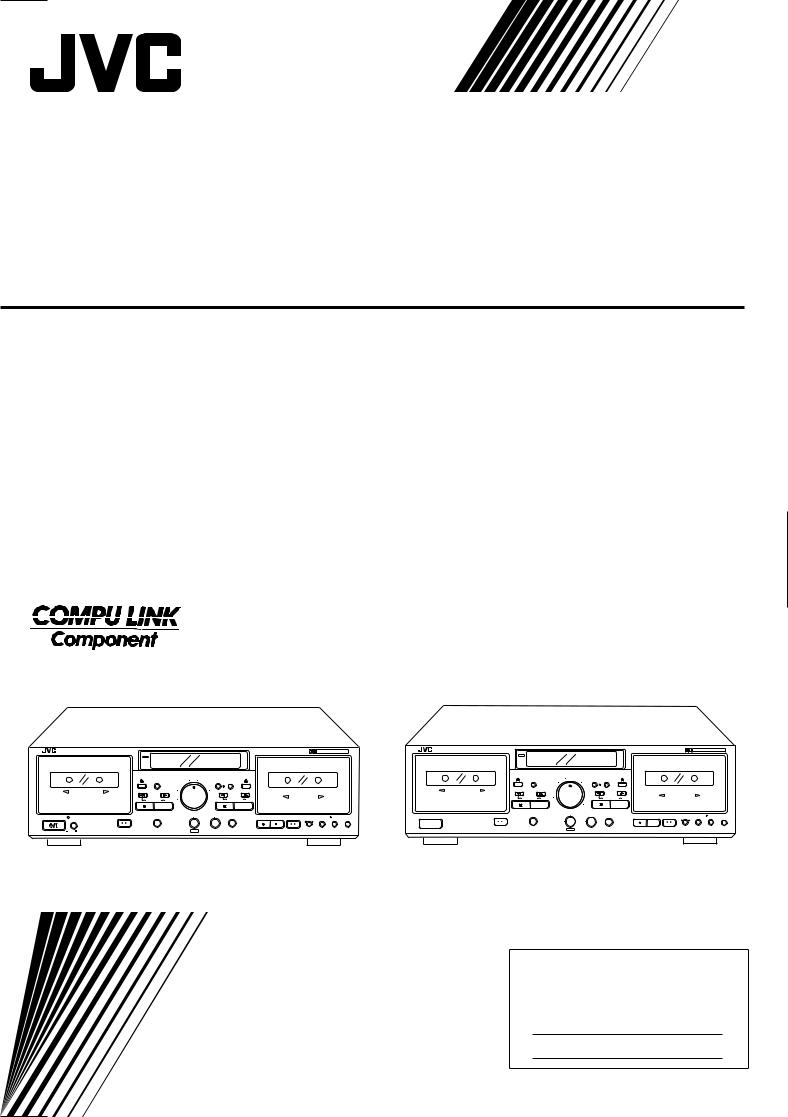
DOUBLE CASSETTE DECK
TD-W354 B/J
Area suffix |
|
B .................... |
U.K. |
J ..................... |
U.S.A. |
|
|
TD-W354 DOUBLE CASSETTE DECK |
|
|
|
|
|
DOLBY B-C NR HX PRO |
TD-W354 DOUBLE CASSETTE DECK |
STANDBY |
|
|
|
|
|
|
DOLBY B-C NR HX PRO |
||||
|
STANDBY |
|
|
|
|
|
|
|
|
|
|
|
|
|
|
|
|
|
|
|
|
INPUT LEVEL |
|
|
|
|
|
|
|
|
INPUT LEVEL |
|
|
|
|
|
|||
|
COUNTER RESET |
|
5 |
COMPU CAL |
COUNTER RESET |
|
|
|
|
|
COUNTER RESET |
4 |
|
5 |
COMPU CAL |
COUNTER RESET |
|
|
|
|
4 |
|
|
|
|
|
|
|
6 |
|
|
|
|
|
|||||
|
|
6 |
|
|
|
|
|
|
|
|
|
|
|
|
|
|
|
|
|
|
|
3 |
|
7 |
|
|
|
|
|
|
|
3 |
|
|
7 |
|
|
|
|
|
|
|
|
|
|
|
A |
AUTO REVERSE |
|
|
|
|
|
|
COMPU CALIBRATION |
|
|||
A |
AUTO REVERSE |
|
|
|
|
COMPU CALIBRATION |
B |
|
2 |
|
|
8 |
|
B |
|||||
2 |
|
8 |
|
PITCH CONTROL |
|
|
|
|
AUTO REVERSE |
|
|||||||||
PITCH CONTROL |
|
|
AUTO REVERSE |
|
PLAYBACK |
|
|
|
|
|
REC/PLAYBACK |
||||||||
PLAYBACK |
|
|
|
|
|
REC/PLAYBACK |
|
|
MUSIC SCAN |
|
|
|
|
MUSIC SCAN |
|
|
|
||
|
MUSIC SCAN |
|
|
|
MUSIC SCAN |
|
|
|
|
|
|
1 |
|
|
9 |
|
|
|
|
|
|
1 |
|
9 |
|
|
|
|
COMPULINK |
|
PLAY |
|
|
PLAY |
|
|
|
||
COMPULINK |
PLAY |
|
PLAY |
|
|
|
|
|
|
|
|
|
|
|
|||||
|
|
|
|
|
|
Component |
|
|
MIN |
|
MAX |
|
|
|
|
||||
Component |
|
MIN |
MAX |
|
|
|
|
|
|
|
|
|
|
|
|
||||
|
PHONES |
PITCH CONTROL |
MIX LEVEL |
MIC |
|
|
|
POWER |
|
PHONES |
|
PITCH CONTROL |
MIX LEVEL |
MIC |
DOLBY NR REVERSEA B SYNCHRO DUBBING |
||||
|
DOLBY NR REVERSEA B SYNCHRO DUBBING |
|
|
|
|
|
|
REC/REC MUTE PAUSE |
|||||||||||
|
POWER |
|
|
|
REC/REC MUTE PAUSE |
|
|
|
|
|
|
B C |
MODE NORM SPEED HIGH SPEED |
||||||
|
|
|
|
B C |
MODE NORM SPEED HIGH SPEED |
|
|
|
|
|
|
|
|
||||||
|
|
|
|
|
|
|
|
|
|
|
|
|
|
|
|
|
|||
|
|
SLOW |
FAST |
MIN MAX |
|
|
|
|
|
|
|
SLOW |
FAST |
MIN MAX |
|
|
|
|
|
|
|
|
|
|
|
|
|
|
|
|
DECK A |
|
|
|
|
|
|||
STANDBY / ON |
ON OFF |
|
DECK A |
|
|
|
|
|
|
|
|
|
|
|
|
|
|
|
|
(B version) (J version)
INSTRUCTIONS
For Customer Use:
Enter below the Model No. and Serial No. which are located on the rear of the cabinet. Retain this information for future reference.
Model No.
Serial No.
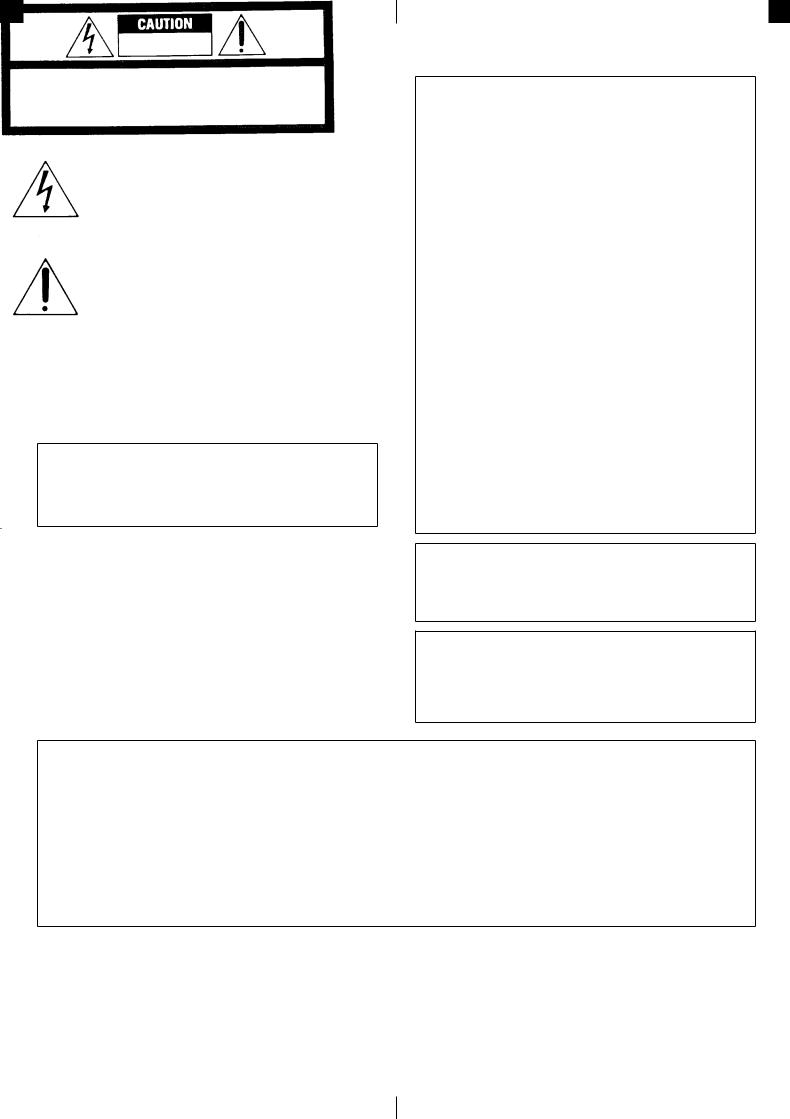
|
RISK OF ELECTRIC SHOCK |
|
DO NOT OPEN |
CAUTION |
``TO REDUCE THE RISK OF ELECTRIC SHOCK |
|
DO NOT REMOVE COVER (OR BACK) |
|
NO USER SERVICEABLE PARTS INSIDE |
REFER SERVICING TO QUALIFIED SERVICE PERSONNEL.''
The lightning flash with arrowhead symbol, within an equilateral triangle, is intended to alert the user to the presence of uninsulated ``dangerous voltage'' within the product's enclosure that may be of sufficient magnitude to constitute a risk of electric shock to persons.
The exclamation point within an equilateral triangle is intended to alert the user to the presence of important operating and maintenance (servicing) instructions in the literature accompanying the appliance.
WARNING:
TO REDUCE THE RISK OF FIRE OR ELECTRIC SHOCK, DO NOT EXPOSE THIS APPLIANCE TO RAIN OR MOISTURE.
IMPORTANT (In the United Kingdom)
Mains Supply (AC 230 V z, 50 Hz only)
DO NOT cut off the mains plug from this equipment. If the plug fitted is not suitable for the power points in your home or the cable is too short to reach a power point, then obtain an appropriate safety approved extension lead or consult your dealer.
BE SURE to replace the fuse only with an identical approved type, as originally fitted and to replace the fuse cover.
If nonetheless the mains plug is cut off ensure to remove the fuse and dispose of the plug immediately, to avoid a possible shock hazard by inadvertent connection to the mains supply.
DO NOT make any connection to the terminal which is marked with the letter E or by the safety earth symbol or coloured green or green-and-yellow.
The wires in the mains lead on this product are coloured in accordance with the following code:
Blue to N (Neutral) or Black Brown to L
(Live) or Red
As these colours may not correspond with the coloured markings identifying the terminals in your plug proceed as follows:
The wire which is coloured blue must be connected to the terminal which is marked with the letter N or coloured black.
The wire which is coloured brown must be connected to the terminal which is marked with the letter L or coloured red.
IF IN DOUBT-CONSULT A COMPETENT ELECTRICIAN.
Please study this instruction manual carefully before starting to operate the unit, in order to use the unit correctly. We take no responsibility for any problems resulting from misuse of this unit by operating this equipment other than instructed in this manual.
WARNING (In the United Kingdom)
Pre-recorded tapes, records or discs should not be re-recorded without the consent of the owners of copyright in the sound recording and in any copyright musical or literary work embodied in that recording as this constitutes an infringement of copyright.
INFORMATION (FOR U.S.A.)
This equipment has been tested and found to comply with the limits for a Class B digital device, pursuant to Part 15 of the FCC Rules. These limits are designed to provide reasonable protection against harmful interference in a residential installation. This equipment generates, uses, and can radiate radio frequency energy and, if not installed and used in accordance with the instructions, may cause harmful interference to radio communications.
However, there is no guarantee that interference will not occur in a particular installation. If this equipment does cause harmful interference to radio or television reception, which can be
determined by turning the equipment off and on, the user is encouraged to try to correct the interference by one or more of the following measures:
-Reorient or relocate the receiving antenna.
-Increase the separation between the equipment and receiver.
-Connect the equipment into an outlet on a circuit different from that to which the receiver is connected.
-Consult the dealer or an experienced radio/TV technician for help.
± 2 ±
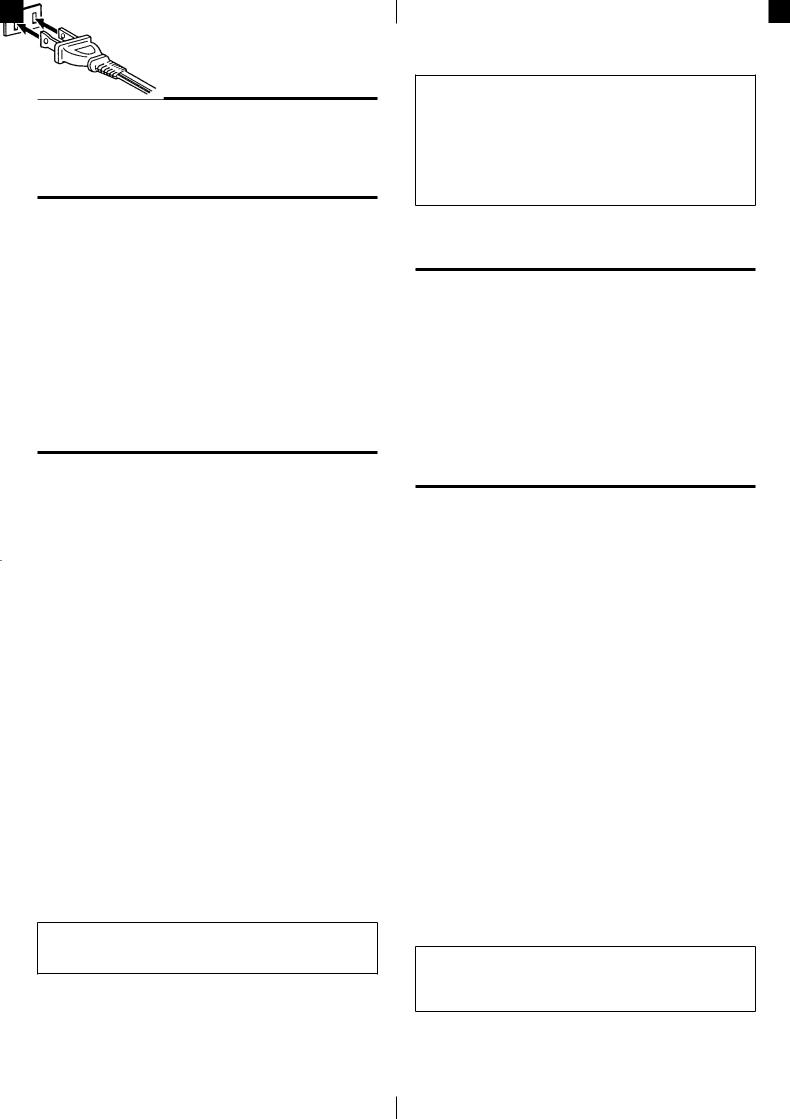
INTRODUCTION
Thank you for purchasing a JVC product. Read this instruction book carefully before operating to be sure of getting optimum performance and longer service life from the unit.
CONTENTS |
|
Features .................................................................................... |
3 |
Auto reverse operation ............................................................. |
3 |
Cautions .................................................................................... |
3 |
Connections .............................................................................. |
5 |
Cassette loading ....................................................................... |
5 |
Names of parts and their functions .......................................... |
6 |
Playback ................................................................................... |
7 |
Multi music scan ....................................................................... |
8 |
Recording ................................................................................. |
8 |
Compu link control system ..................................................... |
11 |
Dubbing .................................................................................. |
12 |
Maintenance ........................................................................... |
13 |
Troubleshooting ...................................................................... |
14 |
Specifications .......................................................................... |
15 |
FEATURES
1.Double auto-reverse mechanism for recording/playback in deck B and playback in deck A
2.The COMPU CAL function automatically sets the record/playback flat frequency characteristics and optimal record/playback tape sensitivity for bringing out maximum tape performance.
3.Full logic mechanism
4.Dolby* HX PRO headroom extension
5.Dolby B & C noise reduction system
6.DDRP (Dynamics Detection Recording Processor) compatibility
The DDRP function is possible only when used with a suitable JVC CD player.
7.2-color FL peak level indicator
8.Digital tape counter respectively for deck A and deck B
9.Synchro start (normal-/high-speed) dubbing
10.Auto tape select mechanism (decks A and B)
11.Multi music scan mechanism for either direction
``Under License of Staar S.A., Brussels, Belgium''
12.PITCH control
13.Microphone mixing is possible
14.COMPU LINK-3 compatible
*Dolby noise reduction and HX Pro headroom extension manufactured under license from Dolby Laboratories Licensing Corporation. HX Pro originated by Bang & Olufsen.
*``DOLBY'', the double-D symbol  and ``HX PRO'' are trademarks of Dolby Laboratories Licensing Corporation.
and ``HX PRO'' are trademarks of Dolby Laboratories Licensing Corporation.
COMPU LINK control system is the convenient system using COMPU LINK-3/SYNCHRO terminals on the rear panel. (See page 5 and 11.)
This product can be combinated with a DDRP (DYNAMICS DETECTION RECORDING PROCESSOR) system (compact disc player + cassette deck, etc.) to enable setting the optimum recording level automatically. Refer to these instructions for details.
AUTO REVERSE OPERATION
The auto reverse operation of this unit turns the tape transport over to the reverse of forward direction automatically when the tape reaches its end during recording or playback.
·Because of cassette shell construction, a tape recorded in the forward direction should be played back in the same direction to obtain stable sound reproduction.
·During recording, auto reverse can be activated only from the forward to the reverse direction. For good sound quality and to avoid accidental erasure of previously recorded material, always start recording with the side A of the tape facing out.
CAUTIONS
1. Prevention of Electric Shocks, Fire Hazards and Damage
1)Even when the POWER switch is set to STANDBY, a very small current will flow. To save power and for safety when not using the unit for an extended period of time, disconnect the power cord from the household AC outlet. (for the J version)
Set the  POWER switch to the OFF position when not in use. (for the B version)
POWER switch to the OFF position when not in use. (for the B version)
2)Do not handle the power cord with wet hands.
3)When unplugging from the wall outlet, always grasp and pull the plug, not the power cord.
4)Consult your nearest dealer when damage, disconnection, or contact failure is found with the cord.
5)Do not bend the cord sharply, or pull or twist it.
6)Do not modify the power cord in any manner.
7)Do not remove screws to disassemble the unit and do not touch anything inside the unit.
8)AC power cord (For the J version only)
The AC power cord of this unit has certain one-way direction connections to prevent electric shock. Refer to the illustration for correct connection. (Fig. 1)
Fig. 1
(For CANADA) CAUTION
TO PREVENT ELECTRIC SHOCK, MATCH WIDE BLADE OF PLUG TO WIDE SLOT, FULLY INSERT.
± 3 ±
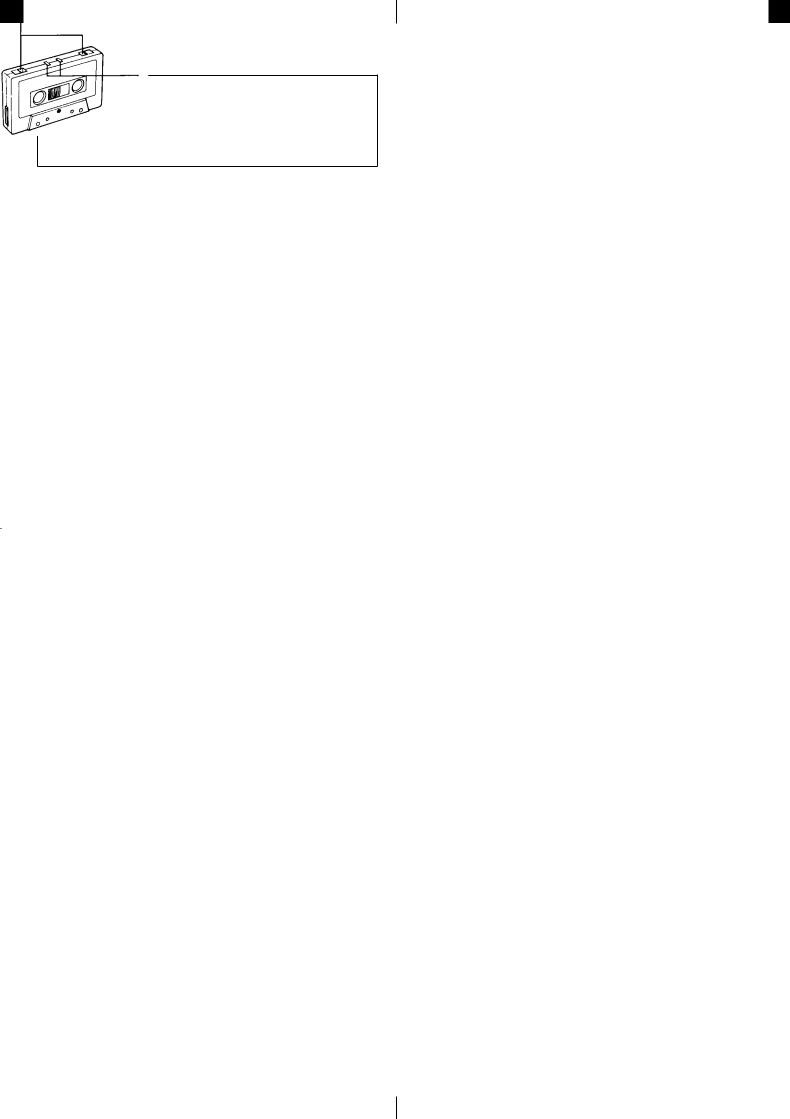
(Pour le CANADA) ATTENTION
POUR EVITER LES CHOCS ELECTRIQUES, INTRODUIRE LA LAME LA PLUS LARGE DE LA FICHE DANS LA BORNE CORRESPONDANTE DE LA PRISE ET POUSSER JUSQU'AU FOND.
9)Do not insert any metallic objects into the unit.
10)Unplug the power cord when there is a possibility of lightning.
11)If water gets inside the unit, unplug the power cord from the outlet and consult your dealer.
12)Do not block the ventilation holes of the unit so that heat can escape. Do not install the unit in a badly ventilated place.
13)Be sure to unplug the power cord from the outlet when going out or when the unit is not in use for an extended period of
time.
2. Installation
1)Avoid placing the unit on or adjacent to an amplifier, to prevent hum from being produced by some types of amplifiers. Move the unit to a place not affected by the amplifier. Keep the unit as far as possible from a TV set.
2)Avoid installing the unit in a location subject to ambient temperatures exceeding 40 °C (104 °F) (e.g. direct sunlight, near heaters, etc.) or less than 0 °C (32 °F), excessive humidity, dust or vibrations.
3)If this set is moved suddenly from a cold place (0 °C) to a
warm place, it may not function properly because of moisture generated inside the unit. The unit will function properly 30 minutes after being moved.
3. Cleaning the cabinet
Never use benzine or thinner for cabinet cleaning as they may damage the surface finish.
4. Cassette tape
1)Loose tape may become tangled in the tape transport mechanism. Remove slack by winding the tape with a pencil.
(Fig. 2)
Fig. 2
Turn the pencil to tighten the tape.
2)The use of C-120 (120 minutes turn around) or thinner tape is not recommended, since characteristic deterioration may occur.
3)To prevent recordings from being erased accidentally, remove the tab(s) with a screwdriver. Reseal the slots with adhesive tape to erase and re-record after the tabs have been broken off.
Side ``A''
Tab ``B'' |
Side ``B'' |
Tab ``A'' |
Adhesive tape
Fig. 3
4)Do not store cassette tapes where there is a magnetic field (e.g. near a TV, etc.) or in a place subject to high temperatures or humidity.
5.Auto tape select mechanism (decks A and B)
This deck has an Auto Tape Select mechanism which distinguishes between different types of tape from holes in the cassette. After the type of tape has been detected, bias and equalization are set to be suitable for the tape.
· Cassettes with the detection holes:
Metal tape (EQ: 70µs) ........................................ |
Type IV |
CrO2 (chrome) tape (EQ: 70µs) .......................... |
Type II |
· Cassettes without the detection holes: |
|
Normal tape (EQ: 120µs) ..................................... |
Type I |
Some earlier types of metal and CrO2 (chrome) tapes may not be provided with the detection holes. Avoid using such tapes, since correct equalization characteristics cannot be obtained. Also do not use ferrochrome tapes whose characteristics do not match this unit.
CrO2 tape detection holes
Metal tape detection holes
6. Operations
1)Noise may be generated if the  POWER switch is switched OFF with the deck set to playback or recording mode. Before switching the
POWER switch is switched OFF with the deck set to playback or recording mode. Before switching the  POWER switch OFF, confirm that the
POWER switch OFF, confirm that the  (stop) button has been pressed. (B version)
(stop) button has been pressed. (B version)
2)Many operations of this unit are performed under the control of a microcomputer. Use the unit only after carefully studying the descriptions and cautions in each item. If operations are done incorrectly, the unit may stop functioning correctly. If this happens, for the J version, unplug the power cord and for the B version, set the  POWER switch to
POWER switch to  OFF, so that the unit can function correctly.
OFF, so that the unit can function correctly.
± 4 ±
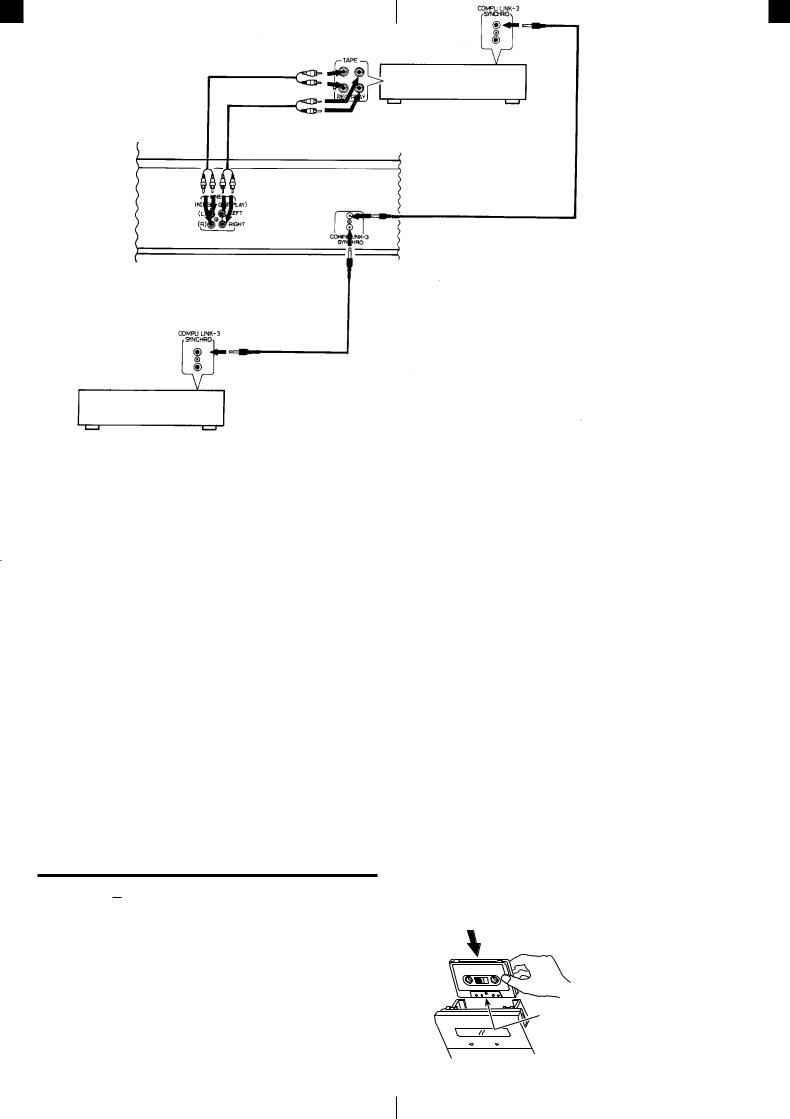
CONNECTIONS
·Do not switch the power on until all the connections are completed.
·Insert the plugs firmly, or poor contact will result, causing noise.
·When the pin-plug cords are employed, always connect the white plug to the left channel terminal. This helps to avoid reversed connections.
·When using the Compu Link Control System version 3, do not connect the power cord to the SWITCHED AC OUTLET of an
amplifier or receiver. In the B version, turn the deck  POWER switch ON. Otherwise, the automatic power on/
POWER switch ON. Otherwise, the automatic power on/
STANDBY function cannot be carried out.
1. Connection to a stereo amplifier Note:
When installing the deck, be sure to install at a distance from your amplifier. If they are stacked, noise (hum) may occur.
CASSETTE LOADING
1.Press the  (eject) button to open the cassette holder.
(eject) button to open the cassette holder.
2.Load a cassette as shown.
3.Press the cassette holder to close it. Be sure to obtain the click sound to close the holder securely.
Notes for the B version:
·If the  POWER switch is set to OFF while the tape is moving, you might not be able to remove the cassette. If this happens, switch the power on again before attempting to remove the cassette.
POWER switch is set to OFF while the tape is moving, you might not be able to remove the cassette. If this happens, switch the power on again before attempting to remove the cassette.
2. Remote cable connection for COMPU LINK
·By connecting a remote cable, COMPU LINK functions (automatic power on/STANDBY, automatic source selection, synchronized recording and DDRP recording) can be performed. In this time the provided pin-plug cords must be also connected.
·When making synchronized recording with a CD player, connect the remote cable to the COMPU LINK-1/SYNCHRO or COMPU LINK-3/SYNCHRO jacks.
Notes:
1.When making synchronized recordings, only a single deck should be connected to the amplifier.
2.If a component is not a JVC COMPU LINK component, bypass it when making the remote cable connections.
3.This deck can be connected with an amplifier and a CD player which have the COMPU LINK-1/SYNCHRO jacks for COMPU LINK performance. (See page 11 for details.)
·Setting the  POWER switch to OFF during playback or recording may cause a malfunction. Always stop playback
POWER switch to OFF during playback or recording may cause a malfunction. Always stop playback
before setting the  POWER switch to OFF.
POWER switch to OFF.
A
Load the cassette with the  tape-exposed edge down.
tape-exposed edge down.
AUTO REVERSE
± 5 ±
